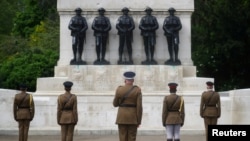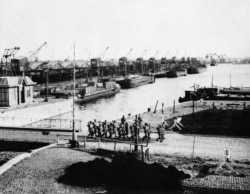Britain and Europe on Saturday mark VE Day, the end of World War II in Europe and advocates are raising the issue that the sacrifices of Black and South Asian soldiers who fought for the Allies are often ignored in commemorations. But efforts are under way to change that.
More than two million African and Caribbean soldiers fought in the First and Second World Wars. And more than two and a-half million soldiers of the British Indian army during the Second World War played an important role in the fight against Japan.
But advocates say their stories are often left out of commemorations like VE day.
Selena Carty is a cultural and ancestral historian who has been advocating for years to include the contribution of all soldiers. She said the current national memory of the world wars are misrepresenting history.
“Because every year when remembrance was done in this country, for many years, there would be sparse black faces, the majority is a white face the same as you would go to France or Germany, or any other European country. The education to be able to support this narrative in regards to why we're celebrating has been neglected, the films that continuously are made, control and show a white narrative,” she said.
During the two world wars, Britain still had a vast global empire, with colonies across the world. The soldiers from these colonies were fighting on behalf of the empire, and not always by choice - and they were not always treated equally. Documents in Britain’s national archives show black African soldiers were paid three times less than white British soldiers.
London School of Economics professor Tarak Barkawi wrote a book about the multicultural armies of British Asia. He said the complicated role of British Empire soldiers in part explains why they there were written out of history.
“One of the problems with colonial armies and commemoration is that neither the independent new state, you know, the decolonized state is not interested in celebrating soldiers who fought to keep the country colonized and fought for the Empire. And neither is the Metropolitan (Britain imperial) power, interested in remembering its dependence on black and brown soldiers,” he said.
Last month, a report by the Commonwealth War Graves Commission concluded that pervasive racism was a reason why Black and Asian soldiers were not commemorated respectfully - or at all - after World War I.
British Defense Secretary Ben Wallace recently apologized in parliament on behalf of the government.
“The report concludes that post World War One in parts of Africa, the Middle East and India, the Commission often compromised its principles and failed to commemorate the war dead equally. There can be no doubt, prejudice played a part in some of the commissioners decisions,” said Wallace.
The report estimates that between 45,000 and 54,000 combatants of Indian and African backgrounds did not receive equal recognition, and that up to 350,000 deaths among them were not commemorated by name, or not at all.





